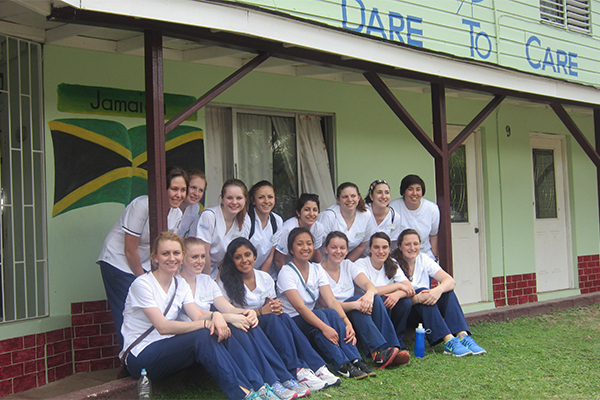
Nurses abroad
UD nursing students spend spring break meeting health challenges in Jamaica
10:05 a.m., April 28, 2014--A lot of college students come back from spring break with a tan.
At the University of Delaware, students who participate in the UD Alternative Breaks program (UDaB) come back with life-changing experiences.
Global Stories
Fulbright awards
Peace Corps plans
In April, UDaB sent more than 200 students, including 15 nursing majors, to work on volunteer projects in communities across the U.S. and abroad.
Led by instructor Diane Rudolphi, the nursing students went to Kingston, Jamaica, to work with a Catholic charity called Mustard Seed Communities (MSC) on a number of health-related projects.
The group stayed at one of MSC’s locations, Sophie’s Place, a home for more than 20 abandoned children with special needs. During the day, they traveled to other MSC homes, including Mary’s Child, which houses teen mothers and their babies, and Jerusalem, a home for 160 residents with a wide variety of needs and health issues from HIV to physical and mental disabilities, such as cerebral palsy, muscular dystrophy, microcephaly, and Down Syndrome.
During the week, five students worked with the teen mothers on issues involving their babies’ health and safety and women’s health education, while the other 10 spent their days at Jerusalem.
“A majority of the residents here needed individual attention, especially during meals,” says sophomore Kathleen Luckner. “Because they didn’t have the means or capacity to have the children on feeding tubes, the children needed to be hand fed every meal. The students jumped in to help and gave the staff tips on how to safely feed some of the children who were at a greater risk of aspiration.”
During their stay, Rudolphi and the students set up a temporary clinic and provided more than 100 health assessments for MSC residents and staff as well as community members. The team discovered some previously undetected issues and sent some people for further evaluations and treatment.
“Our experiences throughout the week exposed us to aspects of nursing that we wouldn’t have learned or experienced by sitting in a classroom,” Luckner says.
Senior Stephanie Everitt says that getting first-hand experience with severe disabilities and chronic illnesses is “invaluable for nursing students.”
“These communities don’t have access to the technology and equipment we’re used to in the U.S. We have machines that tell us the patient’s blood pressure, heart rate and rhythm, and a variety of other measures before we’ve even touched the patient. Without these amenities, we truly have to use our nursing skills, taking manual blood pressures and heart rates, listening to heart and lung sounds, and observing and assessing the patient to look for signs and symptoms of abnormalities.”
At Mary’s Child, sophomore Alexa Brusca recalls a 14-year-old who was “strong, brave, and listened intently to everything discussed and promised to use this knowledge to better the life of her three-month old son.”
Senior Charlene Garcia was impressed with the resilience and compassion of the nurses and staff at Jerusalem.
“To operate a massive facility with a poor nurse-to-patient ratio for several severely challenged residents on a daily basis with the best care they are able to offer is remarkable,” she says. “As we descended from the place we made our home in the Blue Mountains for the final time, we knew that no amount of hot showers or five-star resorts could ever be traded for as extraordinary an experience as this.”
Rudolphi was uncertain of what to expect when she arrived in Jamaica with her students. But, she says, “As the week unfolded, my students became my colleagues who confidently assessed and implemented strategies that impacted over 100 underprivileged children, adults, and unwed mothers and their babies. As the plane lifted off the runway leaving Jamaica, we all sensed that, in some way, we were not quite the same people who had arrived just a week ago.”
Article by Diane Kukich








